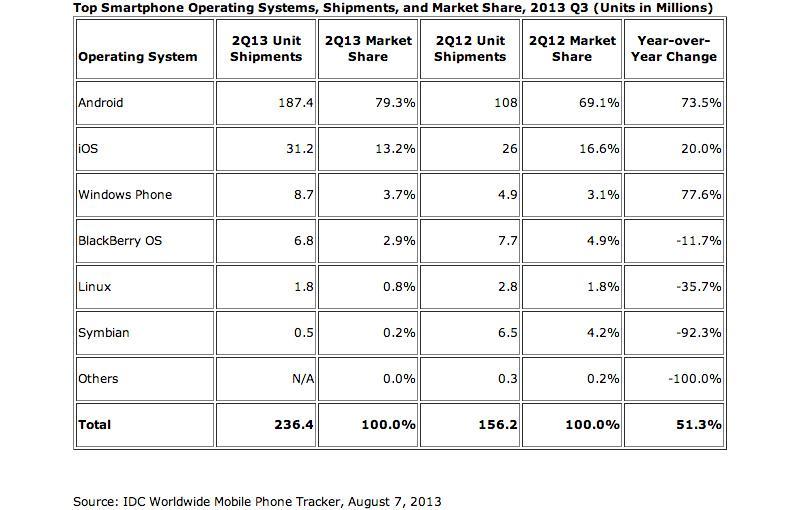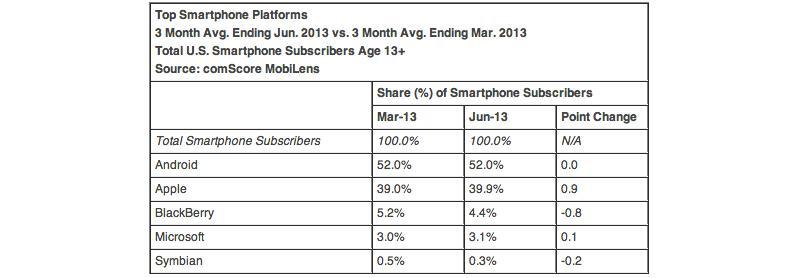
You know, I've never really considered about what day of the week might be best to release a report on smartphone market share, but I'm thinking that it might be Wednesday. That's because both the IDC and comScore today released the results of their most recent surveys of the mobile industry, both around the world and in the U.S.
First up we've got the IDC with some international stats. According to the firm's numbers, there were a total of 187.4 million Android devices shipped around the world in Q2 2013, giving Google's mobile OS a whopping market share of 79.3 percent. The next closest competitor is Apple's iOS, which shipped 31.2 million units for a 13.2 percent market share, which is a drop from the 16.9 percent market share that Apple enjoyed in Q2 2012. Samsung was by far the biggest supplier of Android devices for the quarter, shipping out 73.3 million units for a 39.1 percent market share.
In third place on the IDC's list is Windows Phone, which increased its year over year shipments from 4.9 million in Q2 2012 to 8.7 million in Q2 2013. That gives Microsoft's platform a market share of 3.7 percent. Nokia is, unsurprisingly, the driving force behind most of those devices, shipping 7.1 million units for an 81.6 percent slice of the Windows Phone pie. Finally, BlackBerry shipments and market share dropped from Q2 2012 to Q2 2013, finishing the most recent survey period at 6.8 million units shipped for a market share of 2.9 percent.
That whole story is fairly the same in the U.S. During comScore's three-month survey period between March 2013 and June 2013, Android and iOS held the top two spots with shares of 52 percent and 39.9 percent, respectively. BlackBerry did manage to finish ahead of Windows Phone in the U.S. with a share of 4.4 percent over WP's 3.1 percent, but it's worth noting that BlackBerry lost 0.8 points during the period while Windows Phone gained 0.1.
Moving on to smartphone manufacturers in the U.S., it's all Apple and Samsung. Apple snagged a 39.9 percent share of the market, but Samsung gained more than twice as many points as Apple to finish at 23.7 percent. Meanwhile, HTC, Motorola and LG all lost points to finish with market shares of 8.5 percent, 7.2 percent and 6.6 percent.
It's pretty interesting to take a peek at these snapshots of the mobile industry both around the globe and in the U.S., even if the results aren't exactly what most would call surprising. For example, Samsung's Galaxy S 4 helped itself and Android to gain even more control of the global smartphone war, while also pushing Samsung higher in the U.S. Meanwhile, Nokia continues to crank out most of the Windows Phones around the globe, something that doesn't look like it'll be changing any time soon thanks to recent releases like the Lumia 925, 1020 and 625.
Looking ahead, it'll be interesting to see how these stats look toward the end of 2013. Not only will Samsung have a new Galaxy Note to help boost its numbers again, but Apple will be releasing its the highly-revamped iOS 7 and could also launch a new iPhone or two. Meanwhile, BlackBerry will try to see if the big-screened Z30 can help it to regain some market share, and I wouldn't be surprised if Nokia's got another phone or two that it can churn out as well. How do you think that the smartphone standings will look at the end of 2013?
